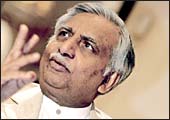 |
 |
| Air Sahara's Roy: Final exit |
Jet Airways' Goyal:
Taking off |
| SAGA OF A DEAL |
| October-November
2005: Sahara boss Subrata Roy puts Air Sahara on the block.
Ernst & Young values it at $500-600 million (Rs 2,250-2,700
crore)
December 2005: Rumours surface
that Air Sahara is looking for a strategic partner, not
a buyer. Vijay Mallya's Kingfisher Airlines emerges as a
contender
January 2006: Mallya backs
out, saying the asking price is too high (he was willing
to pay $250 million or Rs 1,125 crore). On the 19th, Jet
Airways announces that it will buy Air Sahara for $500 million
(Rs 2,250 crore). The deadline for completing the deal is
March 24
February 2006: Air Sahara
pilots go on strike, grounding most of its flights across
the country. After two days of disruptions, Air Sahara decides
to waive the six-month notice period pilots need to give
before leaving
March 2006: American Airlines
announces that it will terminate its code-share deal with
Air Sahara following the change in ownership. The Directorate
General of Civil Aviation (DGCA) announces that it will
divvy up Air Sahara's rights among all the private carriers.
A Jet-Sahara combine, by virtue of being the biggest, would
still get the lion's share, but Jet didn't want a lion's
share; it wanted the whole thing. Deal flounders. Rumours
surface that Jet's Naresh Goyal wants to renegotiate the
price
March 30, 2006: Government
allows Jet Airways to acquire all of Air Sahara's existing
rights. Deal goes through
|
It's
a plot from a typical Bollywood potboiler. Rich boy fights off
rival suitors to win poor girl's heart. A date is fixed for the
engagement, when the script takes its first turn. A powerful guardian
enters the scene and announces that the bride-to-be cannot carry
any dowry with her. The families get into a huddle, the boy's
side threatens to call off the nuptials, the media has a field
day, till yet another twist puts the tale back on track. The guardian
changes his mind and everyone (well, almost) lives happily ever
after.
To cut a long story short, Naresh Goyal and
his Jet Airways (the "rich boy" in our example) can
take over Subrata Roy's Air Sahara lock, stock and barrel. It
gives the former 28 additional night parking slots for its planes
at various airports, 28 leased aircraft and the right to operate
all of Air Sahara's 130-odd domestic flights a day. The icing
on the cake: the Jet-Sahara combine is the only private Indian
airline that can operate international flights till 2008.
However, there are a couple of downsides.
Air Sahara had signed a code-share agreement with American Airlines
on the latter's Chicago-New Delhi service. The US carrier now
wants out of this pact. And Jet's own application to fly to the
US is hanging fire pending an investigation by the US Department
of Homeland Security (DHS). That means the Jet-Sahara combine
can't operate on this lucrative sector. The other problem is that
several of Air Sahara's more experienced pilots and cabin crew,
apprehending job cuts and loss of seniority, have left the carrier
in droves.
Despite this, most analysts are positive
about the deal. A recent ABN Amro report (which recommends a 'Buy'
on the scrip) points out that this deal will increase Jet's fleet
size by 50 per cent to over 70 aircraft. This will change Jet's
position from strong to dominant, despite the fact that in February,
Air Deccan overtook Air Sahara to become the third-largest domestic
airline.
The report says the deal could add 36 per
cent to Jet's revenues and 48 per cent to earnings within 24 months
because its authors believe that the latter will be able to trim
Air Sahara's costs and bring them down to its own impressive levels.
However, it isn't clear what Jet will do
with its acquisition. For now, it seems that the Air Sahara brand
will be retained. However, there is no information on how long
Goyal can use Sahara's brand name and logo. A source close to
Goyal says this issue will be resolved soon.
The deal is done; only the formalities-and
the small matter of Roy pulling out $500 million (Rs 2,250 crore)
from an escrow account in ICICI Bank-have to be completed now.
This means one of the two surviving carriers of the 1992-93 airline
boom has been acquired by the other, becoming, in the process,
the first casualty of the current aviation boom. The question
that's doing the rounds now is: who's next?
|





